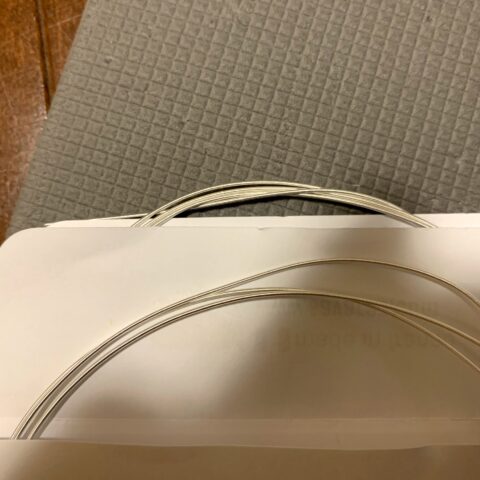For classical guitar players, strings are a consumable item and may be the most expensive part of the year.
I would like to write about why such strings deteriorate and how to prolong their life.
This article explains the mechanism in great detail, but for a simpler explanation, please refer to the following article:


The following article summarizes the string reviews/impressions/information articles in this blog

Deterioration of bass strings
I think there is no question that if you compare treble strings with bass strings, the bass strings will deteriorate first.
So why do bass strings deteriorate? The December 2018 issue of Modern Guitar explained that and I’d like to share it with you. For more information, please see the magazine:
Deterioration due to rust
The bass strings of classical guitars are generally made of thin nylon fibers bundled together and wound with thin metal wire. The simplest deterioration is due to rusting of this metal wire.
However, there are many types of rust. What was interesting in the aforementioned magazine was the following Copper rust greatly degrades the sound, while silver rust does not have such an effect. In the aforementioned magazine, the interesting point was that
The winding wire is not made of a single metal, but is generally a copper wire with another metal plated on top. In most cases, silver is used for the plating. Silver is susceptible to rust, but it only produces a thin layer of rust on the surface. For this reason, the vibration of the string as a whole does not seem to change significantly even if it rusts.
On the other hand, the copper, which is the body of the winding, can rust quite thickly. For this reason When the copper rusts, the sound deteriorates significantly. .
It is easy to identify rust. When silver rusts, the surface of the string will turn black. On the other hand, when copper rusts, the surface becomes bluish. Also, when silver rusts, the thickness of the string does not change much, but when copper rusts, the string looks raised.
My experience is that silver rusts quickly, but copper rusts after a while (months) after the strings are applied. Probably the plating prevents the copper from rusting at first, but as the benefit wears off, the copper, the core, rusts.
So why don’t we just not use copper?
- Using expensive metals increases the price of strings.
- If you use too hard a metal, it will cut the frets, and if you use too soft a metal, it will cut the strings.
So, copper seems to be the best for now.
Degradation due to misalignment of winding and core wires
Another type of degradation is caused by the misalignment of the winding and core wires.
This was also in the aforementioned magazine. Bass strings sound good when the winding and core vibrate in unison, but when this shifts, the sound becomes muffled. Yes, it is.
The reason why it shifts is due to physical damage caused by the winding hitting the frets. After playing a string for a while, the part of the string that touches the fretboard may become dented or the winding may shift, revealing the core inside. This is deterioration.
The mechanism seems to be that the metal wire is tightly wrapped around the nylon fiber so that it vibrates in unison, but due to the damage caused by playing, it is no longer in unison and the sound deteriorates.
People who play a lot are prone to winding damage, and people who don’t play a lot are prone to damage from copper rust.
These two factors reveal the susceptibility of guitar players to deterioration.
First. If you play a lot, the winding will be damaged by frequent contact with the frets before the copper rusts. First, the fretboard is damaged. This will degrade the sound.
On the other hand, if you don’t play much, or if you have several instruments and keep them taut, it is hard to get damage from frets. However, as long as there is moisture in the air, rust will occur, and the rust will eventually deteriorate the sound. Eliminating the moisture will damage the instrument, which is made of wood, so it is not possible.
This means that the sound of the string will deteriorate over time, whether you play it or not.
Deterioration of treble strings
On the other hand, you may have the impression that treble strings are also less susceptible to deterioration than bass strings.
The aforementioned magazine was an article by a manufacturer who mainly produces bass strings, so there is not much information about treble strings, but I would like to write about them based on the information in this magazine and on the Internet.
(Postscript): Mr. Suzutaro Yabu of Figaro, Inc. commented.
Hello (*▽゚*)! Regarding the deterioration of the treble strings, when they hit the flats and lose their roundness, and when the folded molecular chains are fully extended, the force is too efficiently distributed in the vertical direction, resulting in a crunchy sound.
This is a good thing.
When the molecule is fully extended, it is difficult to vibrate.
The first type of deterioration is that specific to treble strings.
Both treble and bass strings are made of nylon, but their structure is very different. Bass strings are made of thin nylon fibers that are bundled together, but Treble strings are called monofilament and are made of a single fiber. In other words, the nylon fibers in the bass strings are made of the same material. In other words, the treble strings are made of one thicker nylon fiber than the bass strings.
This monofilament has the property of stretching when it is pulled, but If it is fully stretched, it will not produce a good sound. It is said that this is because the monofilament has the property of stretching when pulled.
The pitch of a treble string will drop rapidly for a while after it is strung, but this is exactly the “stretched” state. Therefore, if the pitch of the string is not dropping at all when you start to play, you can say that it is fully stretched.
Not only nylon, but carbon strings are also monofilament, so I think the principle is the same.
Since bass strings are also made of nylon fiber, I would think it would be the same. However, according to the magazine mentioned above, bass strings that are not monofilament are less susceptible to this effect.
Deterioration caused by fret contact
The treble strings are also frequently struck by the frets, and this can cause damage.
In the case of high-pitched strings, the nylon is getting worn away. If you trace the back of a string that’s been played for a while with your finger, you’ll see that it’s uneven. I think it is.
Ideally, the treble string should be a perfect circle, but if it is shaved, the pitch will be affected. This means that no matter how much tuning is done, the sound will not match.
It will also probably affect the vibration of the strings by not being a perfect circle.
The further the grinding progresses, the more the strings will break from there. This can cause the string to strike the surface plate of the guitar and scratch it.
How do you know when to change the strings?
Based on the causes of deterioration so far, you will know when to replace the strings.
As for the bass strings.
- The part that touches the fretboard is dented, or the core wire inside is visible.
- Bluish rust developed.
If this happens, it is time to replace it.
As for the treble strings.
- The fretboard is dented.
- No lowering of the notes at the beginning of the guitar playing.
If this happens, it is time to replace it.
However, this is a general rule, so in the end, if you feel that the sound is getting worse, it’s time to replace it.
By the way, in my case, if I play an average of one hour a day, the bass strings will sound like I want to change them in a few weeks, and the treble strings in three or four weeks (using a Savares Creation Cantiga).
There are other cases where this should be replaced.
There are other times when the strings should be replaced.
Bad treble strings
The first and most common problem is that the pitch of the treble strings is not correct. This is commonly referred to as a bad string. This happens when the cross-section of the string is not a perfect circle or the thickness is not consistent. This is generally called a bad string.
In this case, there is nothing you can do but replace the strings with new ones.
The place where the treble string hits the nail becomes rough.
Where the treble strings hit the nails, they will gradually get scratched as you play, especially if your nails are not sufficiently polished.
Eventually, it will become rough and scratchy and make noise when you play it. If this happens, replace it.
Polishing and popping your nails thoroughly will delay the timing of the coarsening process.
Bad bass strings
Although not as frequent as treble strings, bass strings can also be bad.
If the strings didn’t freak you out before you changed them, but now they freak you out after you change them, it could be a bad string. In this case, as with the treble strings, you have no choice but to replace them.
However, if you reduce the tension of the string, the string may swing a lot and hit the fretboard or frets, causing the string to vibrate. It is necessary to check if the strings are vibrating against the frets.
How can I extend the life of my strings?
I would like to consider how to extend the life of a string based on the principles of string deterioration so far.
Loosen the tension of the strings when not playing.
The first thing that comes to mind is Loosen the tension of the strings when you are done playing the guitar. The first thing to think about is to loosen the strings.
This may be especially effective for treble strings. It may also help the bass strings by relieving the pull on the windings and preventing the windings and core from becoming one.
So how much should you loosen it up? The aforementioned magazine recommends lowering it by a whole note (Mi to Re for the first string).
On the other hand, there is a theory that loosening the strings is not a good idea because the instrument is designed to be strung, so it’s hard to say which is better.
Wipe off any moisture or dirt from the surface of the string after you finish playing.
The sound of bass strings deteriorates due to rust, so it is important to prevent rust from occurring.
As you can imagine, there is nothing you can do about moisture in the air, but It’s important to wipe off the moisture and dirt that comes from human play. But I think it is important.
This is especially effective for people who do not play every day. If you play every day, other factors will deteriorate faster than rust.
It is also recommended to use the wiper pads mentioned in the following article:
There are also goods that apply oil to the surface of the strings. This will also help reduce finger noise.
There are also goods with the concept of reviving the sound of strings once they have deteriorated.
Wash your hands before playing
Where dirt comes from in the first place is from our hands.
Wash your hands before playing to keep them clean. It is important to note that your hands are dirtier than you think.
Use long-lasting strings.
Changing the strings themselves can also help.
Bass strings with a long life span
For bass strings, there are various products that claim to have a long life.
For example, the recently released Sabares Cantiga Premium has gained a reputation among professionals for its longevity:

Pro Arte has long had an EXP coating, a product that extends the life of bass strings by coating their surface.
In addition, Pro Arte and Hanabach have released strings that are claimed to last three times longer than conventional strings:
Another manufacturer, Figaro, who wrote an article about their strings in the magazine mentioned above, coats the core wire of the bass strings so that they can maintain the integrated vibration with the winding wire for a long time.
(PS): I’ve collected strings that have a long life span.

There are not many treble strings that claim to have longevity.
On the other hand, treble strings have less sound degradation than bass strings, so there are not many products that sell longevity.
Rather than a product, strings made of fluorocarbon rather than nylon are said to have a longer life because of their higher surface hardness compared to nylon.
Since the Sabares Ariance is well known, the following set with Cantiga Premium bass strings may be the strongest in terms of longevity.
Strings deteriorate whether you use them or not, and I want to play them well and let them deteriorate anyway.
What I found out this time is that guitar strings deteriorate whether you play them or not.
If that is the case, it would be better for the strings to be played well and let them deteriorate.
When strings reach the end of their useful life, they should be reused or properly sorted and disposed of in the garbage.








































